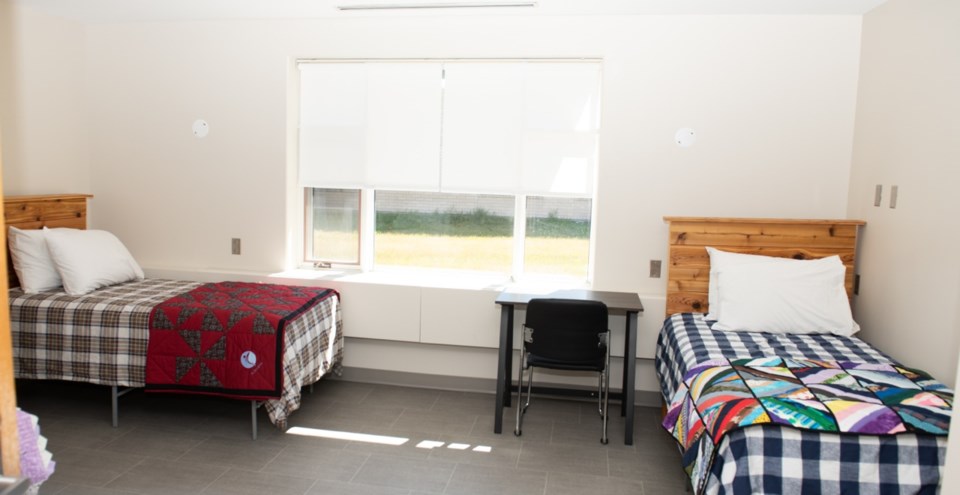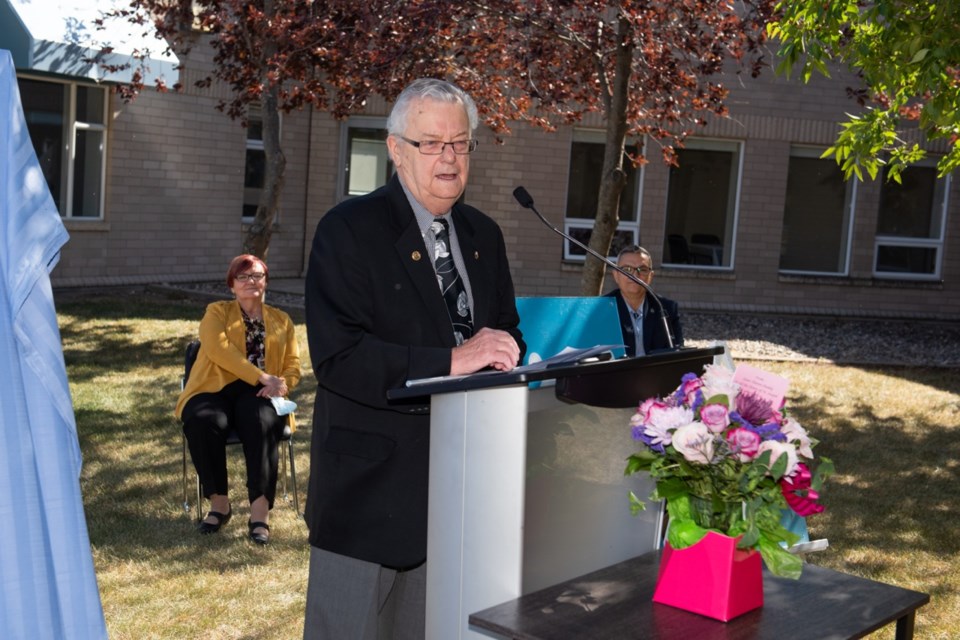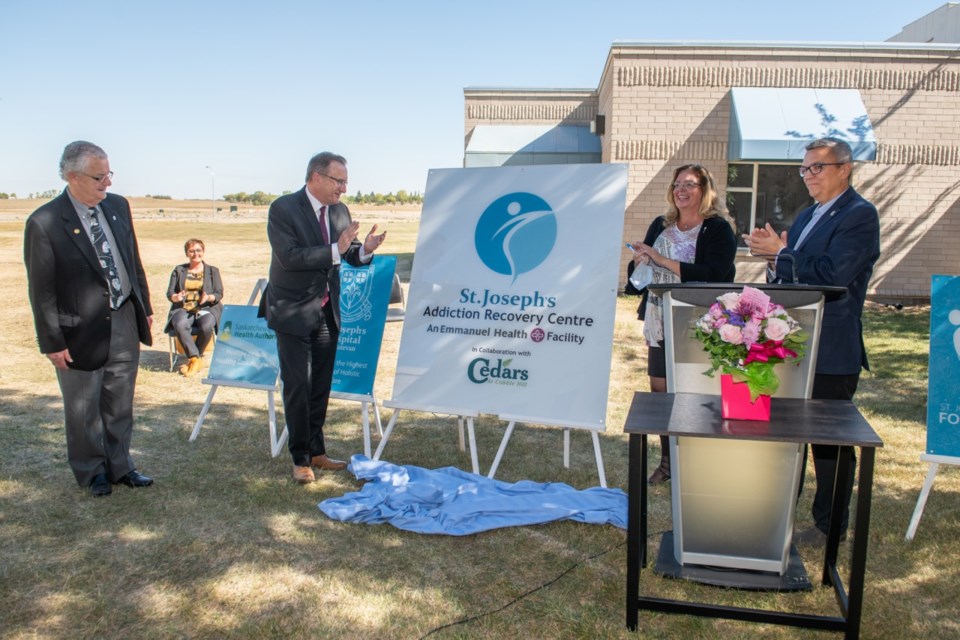When the current St. Joseph’s Hospital was built in Estevan in 1991, it had an addictions treatment centre in its northeast wing. Budget cuts under the New Democratic Party (NDP) government in 1997 closed that addictions centre, and the space was converted into office usage.
On Sept. 10, a grand opening was held for the new St. Joseph’s Addiction Recovery Centre, in the same space as the previous one.
The project is just about ready to receive patients, with the first expected in early October, according to hospital CEO Greg Hoffort. It should be up to full strength by the end of the year. It will have a total of 30 beds – 15 dedicated for the treatment of crystal methamphetamine addiction, five for treatment of other addictions, four for pre-treatment, such as detox and six for post-treatment.
There are 15 new jobs associated with the centre, with the final round of hiring expected this week. Treatment counsellors have been in place for a month, according to Hoffort. Four local physicians have stepped up to provide medical support.

Health Minister Jim Reiter said the proposal was “forward thinking and demonstrated a real connection to the needs of people experiencing addictions problems in Saskatchewan.”
He said the project will make a difference in the lives of people and families impacted by addiction.
“The Government of Saskatchewan has heard from residents that more needs to be done to support people with addictions challenges,” said Reiter. “In particular, we have seen and heard the devastating impacts that crystal meth addiction has had on families and people across the province.
“The journey to recover from crystal meth addiction is difficult, both mentally and physically, but recovery is possible. That's why the government of Saskatchewan has committed to $1.5 million this year plus $1.9 million in annualized funding to establish a new specialized crystal meth centre in Estevan.
“This new centre will be an important resource for people in need of these services, and what helps Saskatchewan people successfully continue on their path to recovery. The centre will develop innovative protocols and approaches to support crystal meth treatment, which will also be available to other addictions treatment centres across the province.
“The centre will continue supporting former patients as they transition their recovery to their home community.”

One example are quilts, made by the Redvers Quilting Group, which patients will take home with them, as well as their pillows.
The area of the hospital where the addictions centre will be located most recently housed public health, mental health, and speech therapy services. Those are being relocated. Contractors have been busy doing the renovations since early August, having been delayed by the COVID-19 crisis.
The patients’ rooms have three beds each, in contrast to the general trend of private rooms in hospitals. That’s because the treatment model works on the idea that people dealing with their addictions should not be alone.
There’s a lecture area, a lounge and a kitchen where patients can get snacks any time of the day. Additional meeting areas are in the former mental health area, and there will soon be a small gym, too. Additionally, a solid privacy fence will be built outside, providing patients privacy from outsiders.
Government Relations Minister and Estevan MLA Lori Carr, who acted as master of ceremonies, noted that 27 years before, her father had the opportunity to go through the treatment centre.
“It was an excellent program and so valuable to the community and the province. So to see it transition into a different use, and now come back to being a treatment centre, is something that is near and dear to me and my family's hearts.”
She added, “Being born and raised here, I saw firsthand how the treatment facility worked years ago and how successful it truly was. And the people that I know that still live in this community are still clean and sober. So to have this facility back and have the services expanded to crystal meth is really important for our area and the province.”
Hoffort said the project started 14 months ago with a fact-finding mission to Cedars at Cobble Hill, an addictions treatment centre in Cobble Hill, British Columbia. They realized something similar could be done in Estevan. But it wouldn’t be the first time.
In 1969, the first St Joseph's addiction center was opened by the Sisters of St. Joseph, Hoffort said. He noted they have received greetings from Dr. Michael Stone, the first-ever clinical manager back then, and from Sister Therese Roddy, who sent the flowers sitting in front of the podium.
“She is just overjoyed that we were able to do this,” he said.
Roddy was the long-time executive director of St. Joseph’s Hospital.
Hoffort said referrals “will come from everywhere.” It will be a provincial treatment facility.
Don Kindopp, chair of St. Joseph’s local council, said, “The field of addiction recovery has made remarkable progress. It is constantly evolving. One such change is that now addiction is widely recognized as a chronic condition, and a progressive disease affecting all aspects of an individual's wellbeing. As such, clinical services are adopting strategies similar to treating chronic conditions. This has led to a massive change or shift in culture as successful recovery is now being measured, not only by abstinence, but by the quality of life in finding solutions to engage and empower individuals in their journey of recovery.
“The patient plays an active part, or an active role, in co-creating the path of their recovery. In an effort to foster intrinsic motivation, patients are encouraged to participate in their own care, and the decision making process impacting their treatment and continued recovery. This service is a bold and necessary step to provide for the treatment of addictions, here at St Joseph's, and Estevan, thank you for your attendance in recognizing this milestone,” Kindopp said.

Reiter said this centre will be very important for crystal meth treatment. “In particular, protocols that they develop here can be expanded and will be used around the province,” he said.
One of those protocols is that unlike other treatment regimes, there will not be a specified number of days, like a 28-day program. Patients will take as long as they need to recover, and that could be two months, as an example, according to Hoffort.
Reiter said, “With in this situation with crystal meth, addictions people, counsellors, experts that I've talked to over the last few years have all ... indicated to me that what worked for other addictions doesn't necessarily work for crystal meth. And it's so important that it has its own type of treatment, its own structure. The treatment here is going to be individualized. You're going to see things like traditional treatment is 28 days, that won't be the case here. It'll be individualized. So you'll see it much more customized, if you would.”
Asked about additional treatment capacity for the opioid crisis that has spread across North America, Reiter said addictions treatments beds and post-and pre-treatment beds are being expanded around the province. He noted there are five treatment beds are part of the Estevan centre for other forms of addiction, not just crystal meth. He said, “We're probably going to need to increase addictions treatment capacity around the province. But you know, when you're talking about specific crystal meth and the protocols that need to be developed, you have to start somewhere. And this just seemed like a logical place. So we want to see how this works out.”




